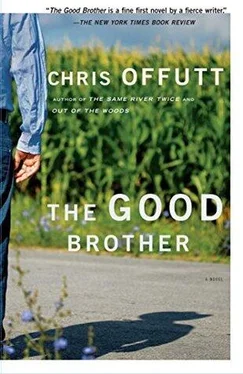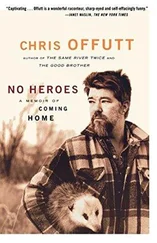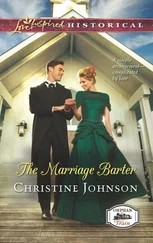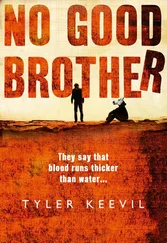His mother’s grass was high again and he decided to cut it. Sara had taken her to town. He was grateful for the time alone at home. The lawnmower engine had a new muffler, and he realized that Marlon had replaced the old one. As he mowed, Virgil wondered vaguely how a muffler could suck up sound. The red leaves of poplar had been the first to drop, and the blades shredded them like a spray of blood.
The work emptied his mind, and an idea leaped into the blank space. He shut off the mower, removed the muffler, carried it into the shed, and fastened it between the jaws of an ancient vise. He retrieved the pistol from the car and selected a drill bit that matched the caliber of the gun. Very carefully, he drilled a hole through the length of the muffler. He changed the drill bit to a sanding head and ran it through the hole until most of the burrs were gone.
After a search of the dim shed, he found a screwdriver with a tiny blade and removed the pistol’s front sight. He wrapped the barrel with electrician’s tape to act as a bushing. He slipped the muffler over the end of the barrel and used a metal hose clamp to hold it in place. He stared at the pistol, unable to figure out a way to ensure accuracy. A pile of wooden dowels lay in the shed. He wiped them clean and tried several until he found one that was identical to the caliber of the pistol He slipped it down the muffler and into the barrel to align the muffler’s hole with the bore of the pistol. He tightened the hose clamp and removed the dowel.
Outside he loaded the pistol. His mother was still gone and he fired into the freshly mown grass. The sound was more altered than silenced, having lost the sharpness of a pistol shot. He fired several more times. It was loud, but no one could identify the sound as gunfire.
His mother would return soon, and he wanted to avoid his sister. Dust rose from his boots as he left. Ten thousand times he’d walked this route. He knew every tree along the way, recognized the bend of bough, each new scale of bark. He entered the woods as if stepping into a house he was ready to abandon, seeing everything for the last time. Sunlight dappled the forest floor. He followed a game trail to Shawnee Rock. Gray moss furred the north face. He sat within its shadow, remembering that the area was haunted. He’d never seen a spirit and didn’t know anyone who had.
He hoped for guidance, but none came. He was just a man alone in the woods. When he spoke, the sound hung in the air.
“So long, Boyd.”
He lay on his side with his back against the base of the rock. He closed his eyes. Sleep came on him like a layer of loam.
He woke to late afternoon’s red light cutting through the trees. He thought he should have dreamed something profound, but there was only the awareness of being cold and stiff. He walked to his mother’s house. She stood in the kitchen, puzzled by the groceries he’d brought from his trailer.
“Fridge broke,” he said.
She began putting items away with smooth, practiced motions. He’d always found it easy to lie to her because she preferred to embrace falsehoods rather than accept unpleasant facts. A path worn in the linoleum led from sink to refrigerator to stove. Her face had aged. Virgil was overwhelmed by sympathy and love. She was going to suffer more, and for the first time since he’d embarked on his plan, he felt regret. His departure would mean the loss of another man in her life. She’d be down to a son-in-law.
Virgil moved to her and hugged her tight. He felt her strength passing into him as it had during bad times as a child, and he was astounded once more that he had come from her body. He was leaving forever and he wondered if she would forgive him.
His mother returned his hug with great ferocity. As he relaxed, she did, too, following their familiar cues. They released each other. A pearl of water lay on her cheek. He wiped it with his thumb, a gesture he recognized as hers, one of many he carried.
“How’s Sara?” he said.
“Doing good. Said you stopped over for a visit. Said you’re full of plans.”
“Well.”
“Reckon we’ll all know soon enough.”
Her hair contained more gray than dark, a change he hadn’t noticed before.
“You got anything needs done?”
She thought for a moment, cocking her head. The familiarity of the trait startled him. It was as if he was seeing her again after twenty years away.
“No,” she said. “I’m pretty much caught up. Plenty of wood. Chimney flue’s open. Gutters are clean.”
“Marlon’s been helping. Sara’s lucky there.”
“We all are, Virge.”
“I just thought you might need something.”
“Having you here is enough.”
Virgil was trying to memorize her hands and the play of light on her face. She was wearing her Rocksalt clothes, which were slightly garish and tacky. She looked exactly like what she was — a country woman dressed for town. He supposed all people resembled what they were. He would have to change his style of clothing.
They prepared supper together, his mother tolerating his assistance though he knew she preferred to work alone, a family trait. The sunshine fell abruptly away and a chill slid through the room. He performed his tasks with care, hoarding each gesture for future memory.
They ate in the comfort of silence at the table he’d sat before all his life. They washed dishes together. Afterwards they sat in the living room before the blank television.
“What,” his mother said to him.
“Nothing.”
“You got something in your craw, Virge. I know the signs.”
“Just felt like seeing you.”
“What brought that on?”
“I don’t know, Mom.”
“You sure?”
“No reason.”
“You never done nothing without a reason your whole life.”
“Reckon I’m changing.”
“You’re an educated hillbilly,” his mother said. “The best of two worlds.”
“Or maybe the worst.”
“Now you’re talking out of your books.”
“Not with you, I ain’t.”
“I’m proud of you, son,”
Virgil turned on the television. His mother possessed a surprising amount of information on the private lives of the actors. She knew more about them than she did about Virgil. At nine o’clock she said good night. Virgil rose from the chair by the couch, his father’s chair, then Boyd’s, soon to be Marlon’s.
“Mom.”
“Yes,”
“I, uh.”
“I love you, Virge.”
“Me, too.”
She left the room and Virgil felt pummeled by loss. He left the TV on so she’d think he was still watching. In the bathroom he found an unopened bottle of Valium that the doctor had given her after Boyd’s death. He ground a few of the blue pills to dust and mixed it with raw hamburger.
The autumn, air carried a chill that focused his mind. Stars glinted in the black sky. His brain worked better in cold weather and he decided to go somewhere that offered a long winter.
He drove off the hill, and on impulse he stopped at the post office. The flag was gone, rolled up on its pole and lying in the building, but Zephaniah would still be there. He lived in the rear of the old company store. He’d long ago trained the community not to bother him over postal matters in his off hours. Virgil went to the back and knocked. Zephaniah was wearing slippers that made him walk differently. He looked older than at work. Virgil sat on the couch. The last time he’d been inside was as a child when he and Boyd had asked for water in summer.
A black-and-white photograph of a man and woman hung inside an embossed frame. The woman was pretty. The glass was rippled.
“That you?” Virgil said.
“And Pearl,” Zephaniah said, “She died,”
Virgil had assumed that Zeph had always been alone. The thought of him as a young man in love was disconcerting.
Читать дальше












